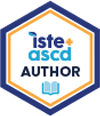

Event Information
Content and engagement:
Real-world problems seldom fit neatly into content silos. By designing projects around local issues that students genuinely want to tackle, teachers can make interdisciplinary connections that deepen learning, increase engagement, and build students’ competence as creative problem solvers and contributors to their communities.
This session will showcase projects from diverse contexts in which students have partnered with community allies to address issues ranging from pollution in local watersheds to improving childhood nutrition in food deserts to chronicling untold stories with student-produced podcasts. Through these projects, students master both academic and non-academic competencies, such as collaboration and self-direction, and reflect on their own growth as engaged citizens and empowered learners.
After multimedia examples, audience members take part in a poll about real-world projects in their own contexts. How often do their students have such experiences? How prepared are educators to guide this kind of learning? What barriers get in the way?
Key message of this session is that such experiences are too valuable to reserve for only certain student profiles, school models, or demographics. The pandemic, increasing severity of climate-related disasters, and persistent economic inequities have shown us the urgency of preparing all students to be problem solvers who can adapt to a fast-changing world. To be prepared to survive and thrive, all students need to develop their capacity for both problem seeking and problem solving. Students develop these essential competences over time through developmentally appropriate experiences guided by teachers. This session provides attendees with strategies and resources they need to bring such experiences to life with their students.
Time:
Entry event: 10 minutes
Compelling project examples from diverse contexts challenge audience to consider what’s possible when PBL focuses on meaningful community issues.
Online survey: 5 minutes
Attendees use devices to respond to a survey about their experiences with authentic PBL and reveal barriers, questions.
Going deeper: 35 minutes
Presenter addresses frequently-asked questions about PBL and invites audience to reflect in small-group discussions. For example:
--How to identify students’ interests and concerns that are “project worthy” and developmentally appropriate
--How to ensure that projects address meaningful academic content
--How to use formative assessment to help students reach learning goals
--How to expand opportunities for cross-disciplinary project planning
--How to connect beyond the classroom with community experts and allies
(Online resources will be provided for attendees to explore as follow-up to this session. )
Closing reflections/next steps: 10 minutes
Audience shares reflections and project ideas on digital whiteboard.
Process:
The session will use a variety of strategies to engage audience, including:
• Multimedia presentation/storytelling to generate interest, spark curiosity
• Online survey to learn about attendees’ experiences, surface their questions
• Guided discussions, with presenter introducing specific strategies and attendees discussing in small groups
• Digital whiteboard to capture attendees’ reflections and their project ideas
• Online resources as a session take-away for future use
A sizeable and growing body of research underscores key design elements for high-quality project-based learning and indicates positive and equitable student outcomes when projects are facilitated with attention to best practices. Many resources will inform this session, including books and articles by the presenter. Supporting research includes:
Boss, S. (2019, Aug. 6). Podcasting creates an audience for student storytellers. Edutopia. https://www.edutopia.org/article/podcasting-creates-audience-student-storytellers
Boss, S. (2023, April 26). Want to improve education? Ask students for input. Edutopia. https://www.edutopia.org/article/improving-education-student-input
Boss, S., & Krauss, J. (2018) Reinventing project-based learning: Your Field Guide to real-world projects for the digital age, 3rd ed. Eugene, OR: ISTE. (Note: Translation published in China.)
Boss, S., with Larmer, J. (2018). Project based teaching: How to create rigorous and engaging learning experiences. Alexandria, VA: ASCD. (Note: Translations published in multiple countries.)
Evans, M., Moran, C.M., & Sanchez, E. (2024). Place-based learning: Connecting inquiry, community, and culture. Bloomington, IN: Solution Tree. (Note: Interview with authors by Suzie Boss: https://www.edutopia.org/article/strategies-teaching-place-based-learning)
Jaquith, A., & Zilezinski, M. (2018, Nov. 21). Evaluating deeper learning: Retrospect and prospect. SCOPE Research Brief. Stanford, CA: Stanford Center for Opportunity Policy in Education. Download from https://hewlett.org/library/evaluating-deeper-learning-retrospect-and-prospect/
Larmer, J., Mergendoller, J., & Boss, S. (2015). Setting the standard for project based learning. Alexandria, VA: ASCD.
Terada, Y. (2021, Feb. 21). New research makes a powerful case for PBL. Edutopia. https://www.edutopia.org/article/new-research-makes-powerful-case-pbl

